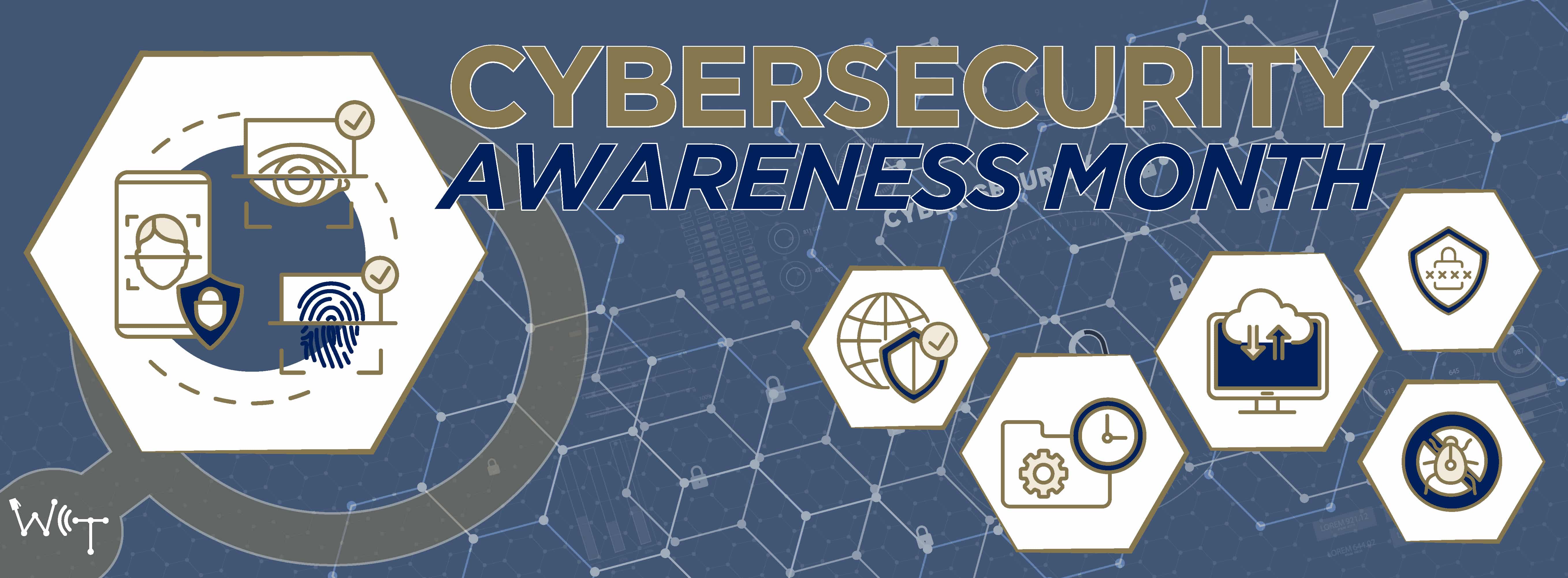
Cybersecurity Awareness Month
With technology all around us and being such an important part of our daily lives, ensuring you have a secure online presence is essential. Cybersecurity Awareness Month, observed every October, serves as a crucial reminder of the ever-present threats in the digital realm and the importance of safeguarding our data, privacy, and online activities. Turning Cybersecurity Awareness Month into a valuable initiative for your business involves a strategic approach to educate employees, strengthen your cybersecurity practices, and promote a secure working environment.
Tips for Enhancing Cybersecurity
Strong Passwords: Use complex, unique passwords for each online account. Consider using a password manager to generate and store your passwords securely. Passwords should be unique to each application and information source, contain at least eight to fourteen characters, contain both uppercase and lowercase letters, numbers, and special characters, and stay away from obvious information like names and birthdays.
Multi-Factor Authentication (MFA): 99% of attacks that compromise accounts can be blocked by MFA. Enable MFA wherever possible. MFA adds an extra layer of security by requiring you to provide multiple forms of verification to access your accounts. WatchGuard AuthPoint® grants you access to all the features and the complete protection you need to secure your users.
Endpoint Detection and Response (EDR): EDR is a modern security tool and the next iteration of device-based protection. EDR is a step above regular antivirus. By having an EDR in place, you can quickly detect and respond to security threats on individual devices, reducing the risk of data breaches and minimizing the impact of cyberattacks. EDR provides real-time monitoring, incident investigation capabilities, automated response mechanisms, and strengthens overall cybersecurity defenses, all which help ensure timely threat mitigation.
Email Filtering: Barracuda® Spam filtering is crucial to protect email users from unsolicited and potentially harmful messages. This improves productivity by keeping inboxes clutter-free and reducing the risk of falling victim to phishing or malware attacks. It also helps safeguard network resources and maintain the integrity of communication by ensuring that legitimate emails receive the attention they deserve.
Email Archiving: Email archiving is essential for businesses and organizations to maintain compliance with regulatory requirements and to preserve critical communication records. This reduces legal and operational risks associated with data loss or disputes. Additionally, it enables efficient retrieval of historical emails, enhancing productivity and supporting investigations or audits when necessary.
Firewall Geolocation: WatchGuard® Firewall Geolocation is a cybersecurity technique that enables organizations to implement more precise access controls, allowing or denying traffic based on the geographical location of users or devices. This helps enhance security by preventing unauthorized access from specific regions, reducing the attack surface, and tailoring security policies to regional compliance requirements.
Security Information and Event Management (SIEM): SIEM is a crucial cybersecurity tool that helps organizations detect and respond to security threats by collecting and analyzing data from various sources to provide real-time insights into their security posture. SIEM solutions enable proactive threat detection, compliance monitoring, and incident response, enhancing an organization's overall security resilience.
End user training: End user training can help protect the weakest link—your staff. Regardless of how many security levels are put in place, there will always be zero-day threats. End users that have been provided training are less likely to fall victim to these threats. Knowing to be cautious of unsolicited emails, messages, or links. Verifying the sender's authenticity before clicking on any suspicious links or downloading attachments. Reporting phishing attempts to the appropriate authorities or your IT department. These are all important pieces that training can help employees master. Ensure that your employees receive cybersecurity training. Human error is a common cause of security breaches.
Patching: Ensuring your operating systems, applications, software, and web browsers are up to date is an important piece of having a secure working environment. Cybercriminals often exploit known vulnerabilities, so updating your software helps patch these security holes.
Data Retention Policies: It is essential to establish guidelines and practices that organizations establish to specify how long they should retain various types of data. This ensures critical data is maintained for a certain period and accessed, changed, or deleted by only appropriate individuals. Identify who needs access to files and create groups based on access privileges.
Backups: Backups are there for when everything else fails. Backups help businesses recover critical files and infrastructure quickly and efficiently to resume normal business activities. Regularly back up your important data to a secure, immutable, cloud storage service or an external drive that is removed from the premises. Verify, verify, verify! Make sure the backups actually work, and you can recover what you need.
Incident Response Plan: Develop and implement an incident response plan so that you know how to react in case of a cyber incident. Time is crucial when responding to threats. Creating and defining steps to be taken are important for a structured recovery. Make a list of business-critical systems and the order of their importance. Include, with the list of steps to be taken, people and phone numbers who can help.
Stay informed: Technology is constantly evolving. Keep up with cybersecurity news and trends. Awareness is your best defense against evolving threats. Continue to review your IT environment. We offer network assessments to provide you with an in-depth analysis of your current IT infrastructure.
Cybersecurity Awareness Month serves as a crucial reminder that cybersecurity is everyone's responsibility. By staying informed, adopting best practices, and promoting a culture of cybersecurity, we can collectively mitigate the risks posed by cyber threats. Protecting our digital frontier is not just an annual observance; it's a continuous effort that requires vigilance, education, and collaboration throughout the year. There is no substitute for security. Protect your IT environment. We are here to support you through your cybersecurity needs.
